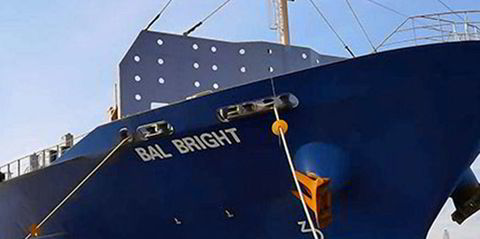The lack of Asian support for the Poseidon Principles green ship financing agenda threatens to undermine the initiative.
TradeWinds revealed last week that French bank Credit Industriel et Commercial had committed to the initiative to encourage shipowners to cut carbon emissions, and Export Credit Norway became the first export credit agency to sign up. But the 15-member group still does not include any Asian financiers.
This absence, six months after its launch, is a key concern, according to Alison Weal, who was appointed a London-based maritime sector partner at law firm Winston & Strawn in August.
'Minority backing'
The initial signatories represented $100bn in investments, accounting for roughly 22% of the $450bn global ship finance portfolio, but Weal said: “This is a minority backing. Unless this changes, such a lack of support could compromise the effectiveness of the principles.
“If enough capital providers do not sign up to the principles, it is possible that shipowners with high carbon intensity tonnage could get their capital elsewhere, leaving Poseidon Principles signatory banks with a smaller share of the sector.”
The largely European geographic spread is not helpful in delivering the intended results of bringing banks’ shipping portfolios into line with the IMO’s environmental target of halving greenhouse gas emissions by 2050.
Chinese banks top the list of shipping lenders, and Weal said the Export-Import Bank of China has become the industry’s largest global lender, overtaking DNB.

She said the reasons for the lack of Asian support are not clear. “Possibly there is less regulatory pressure on them compared to their European counterparts and this could be a factor behind the slow rate of uptake thus far.”
Stipulations concern
Their considerations may include waiting to see how much support shipping companies give the principles, and concerns that attaching a greater number of environmental stipulations to loans might encourage clients to look at alternative forms of capital, such as private equity investment, which is not regulated in the same way as banks.
Not being beholden to the principles puts the Asian banks on a similar footing to private equity investors as regards environmental requirements in credit decisions, and potentially puts the Asian banks in a more competitive position vis-a-vis the Poseidon Principles signatories
Alison Weal
“Not being beholden to the principles puts the Asian banks on a similar footing to private equity investors as regards environmental requirements in credit decisions, and potentially puts the Asian banks in a more competitive position vis-a-vis the Poseidon Principles signatories,” Weal told TradeWinds.
Poseidon Principles chairman Michael Parker, head of global shipping and logistics at Citigroup, said in October that he hopes to have 80% to 90% of all “serious shipping lenders” signed up within the next 12 months.
Group member Paul Taylor, global head of shipping at Societe Generale, told TradeWinds last week he is confident Asian banks will begin to join soon. He said it is important that the main Asian banks and lessors — particularly Chinese, Japanese, South Korean and Singaporean institutions — sign up.
Anonymised scores
Poseidon Principles banks aim to publish anonymised scores for their current loan portfolios by the end of 2020, with the emissions assessments made mainly by classification societies.
Tristan Smith, reader in energy and shipping at University College London’s Energy Institute, and an advisor to the team that drew up the principles, said there is nothing to stop a Poseidon bank finding its portfolio is “above the line” and carrying on operating it.
“But if they do find they are above the line and want to remedy this, then what they do next will depend on what caused this in the first place,” Smith said.
“Solutions could be to help raise extra finance for retrofits, to discuss potential changes in average operating speeds, to look at disinvesting from high carbon intensity ships and seeking lower carbon intensity investment opportunities.”
Problems could arise, though, where banking facilities are syndicated, if some of the banks are signatories to the Poseidon Principles and others are not. A key question is whether the decarbonisation calculations of vessels would be shared.
Smith said the assessments look at a bank’s portfolio as a whole, and there may be good commercial reasons why a ship happens to have a comparatively high carbon intensity.
“A bank can hold such assets and either accept that they will overall have a poor Poseidon Principles index, or balance them out with some ships that are significantly below the average carbon intensity,” he told TradeWinds.
“I don’t see that these ships will be ‘unfinancable’ overnight, even within the signatories of the principles.”







